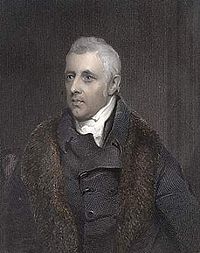Dudley Ryder, 1st Earl of Harrowby
|
The Right Honourable The Earl of Harrowby PC FSA |
|
|---|---|
 |
|
| Secretary of State for Foreign Affairs | |
|
In office 14 May 1804 – 11 January 1805 |
|
| Monarch | George III |
| Prime Minister | Rt. Hon. William Pitt the Younger |
| Preceded by | The Lord Hawkesbury |
| Succeeded by | The Lord Mulgrave |
| Lord President of the Council | |
|
In office 11 June 1812 – 17 August 1827 |
|
| Monarch |
George III George IV |
| Prime Minister | The Earl of Liverpool |
| Preceded by | The Viscount Sidmouth |
| Succeeded by | The Duke of Portland |
| Personal details | |
| Born |
22 December 1762 London |
| Died |
26 December 1847 (aged 85) Sandon Hall, Staffordshire |
| Nationality | British |
| Political party | Tory |
| Spouse(s) | Lady Susanna Leveson-Gower (d. 1838) |
| Alma mater | St John's College, Cambridge |
Dudley Ryder, 1st Earl of Harrowby, PC, FSA (22 December 1762 – 26 December 1847) was a prominent British politician of the Pittite faction and the Tory party.
Born in London, Ryder was the eldest son of Nathaniel Ryder, 1st Baron Harrowby, and his wife Elizabeth (née Terrick). Sir Dudley Ryder was his grandfather and Richard Ryder his younger brother. He was educated at Harrow School and St John's College, Cambridge.
Harrowby was elected to his father's old Parliament seat of Tiverton in 1784. His administrative career began with an appointment to be Joint Parliamentary Under-Secretary of State for Foreign Affairs in 1789. In 1791 he was appointed joint Paymaster of the Forces, having been made Vice-President of the Board of Trade in 1790. He resigned the positions and also that of Treasurer of the Navy when he succeeded to his father's barony in June 1803. In 1804 he was Secretary of State for Foreign Affairs. After James Monroe's first interview with him on 30 May 1804, "...Monroe reported to his Government that Lord Harrowby's manners were designedly unfriendly; his reception was rough, his comments on the Senate's habit of mutilating treaties were harsh, his conduct throughout the intervuew was calculated to wound and to irritate."
...
Wikipedia
